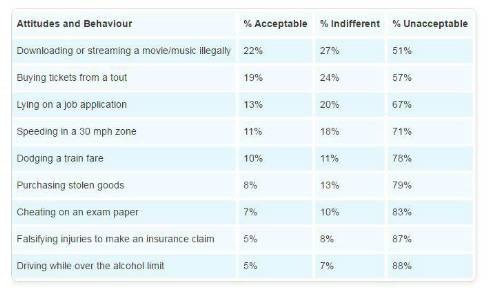-
Falsifying whiplash injuries deemed worse than buying stolen goods
-
Aviva data shows 1 in 9 whiplash claims are tainted by fraud
-
Whiplash adds £93 to the average motor insurance premium
The study shows that 87% say it’s unacceptable to make a false whiplash claim, compared to 88% who say the same about drink-driving. This compares to the four-in-five (79%) who don’t agree with purchasing stolen goods.
The research explores Brits’ attitudes to, and behaviours around, a variety of situations and their perceived consequences, in order to better understand why the compensation culture around whiplash is so prevalent in the UK.
Although, when it comes to spurious insurance claims, the vast majority of people believe falsifying injuries is unacceptable – still 5% think it is fine and 8% are indifferent towards it. The findings correlate with Aviva’s data that shows 11% of the personal injury claims it handles each year are tainted by fraud.
Rob Townend, Claims Director, Aviva UK General Insurance, said: “It’s great to see that false whiplash claims are completely unacceptable for the vast majority of Brits, however there’s no such thing as victimless crime and it just takes a few bad apples to spoil it for the rest of us. The temptation of financial or personal gain often causes people to wrestle with decisions, while others turn a blind eye entirely – especially when the immediate impact of their actions is not apparent.
“Thankfully the Government is set to put an end to the whiplash gravy train and Aviva will pass 100% of the savings to our customers. For the honest majority this will mean reduced premiums and a refocus on getting legitimate claimants back on their feet with care not cash.”
According to Aviva, whiplash costs motorists £2.5bn a year and adds £93 to the average motor insurance premium. Aviva currently has around 14,000 suspect whiplash claims under investigation. Recently it successfully challenged a £250,000 insurance claim by 46 passengers on a ‘party bus’, where each filed individual whiplash claims as a result of a low-speed incident causing only £70 worth of damage to the vehicle. Also, on 15th April, semi-professional footballer Gary Burnett was convicted to four months in prison, suspended for one year, for contempt of court following a false whiplash claim against Aviva.
The study also shows that over a fifth (22%) of UK adults consider it acceptable to illegally download or stream TV, films and music, while one in ten condone train fare dodging (10%) and speeding in a 30 mph zone (11%).
And the research reveals the public wrestles with its conscience in certain circumstances: over two-thirds (69%) of respondents said they would let an independent shop owner know if they were undercharged, but less than half (44%) would do the same for a large supermarket chain.
Similarly, one-fifth (19%) said they would be comfortable buying tickets from an unofficial tout, but less than one-in-ten (8%) would feel the same about purchasing stolen goods.
Rob Townend, continued: “Britain is generally a nation of considerate citizens who do the right thing. But it’s clear a minority are lured by the incentive of ‘easy cash’ that exists within the motor claims compensation culture. In the end, we all pay for this through inflated premiums, not to mention the wider cost to society of this unhealthy whiplash claims culture.”
Aviva has devised an interactive online test so that the British public can reflect on how they would act if faced with different scenarios, and see how their attitudes compare to the rest of the country. Visit here to take the test. |


